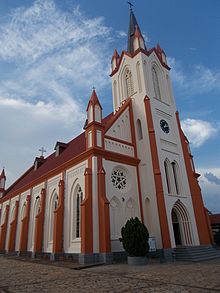Freedom of religion in Mauritania is limited by the Government. The constitution establishes the country as an Islamic republic and decrees that Islam is the religion of its citizens and the State.

Freedom of religion in Afghanistan changed during the Islamic Republic installed in 2002 following a U.S.-led invasion that displaced the former Taliban government.
Freedom of religion in Algeria is regulated by the Algerian Constitution, which declares Islam to be the state religion but also declares that "freedom of creed and opinion is inviolable" ; it prohibits discrimination, Article 29 states "All citizens are equal before the law. No discrimination shall prevail because of birth, race, sex, opinion or any other personal or social condition or circumstance". In practice, the government generally respects this, with some limited exceptions.

Sunni Islam is the dominant religion in Jordan. Muslims make up about 97.2% of the country's population. A few of them are Shiites. Many Shia in Jordan are refugees from Syria, Lebanon, and Iraq.
According to various polls, the majority of Kazakhstan's citizens, primarily ethnic Kazakhs, identify as Sunni Muslims. In 2020, Shia Muslims made up 0.55% of the population.
The Turkmen of Turkmenistan, are predominantly Muslims. According the U.S. Department of State's International Religious Freedom Report for 2022,
According to U.S. government estimates, the country is 89 percent Muslim, 9 percent Eastern Orthodox, and 2 percent other. There are small communities of Jehovah's Witnesses, Shia Muslims, Baha’is, Roman Catholics, the International Society for Krishna Consciousness, and evangelical Christians, including Baptists and Pentecostals. Most ethnic Russians and Armenians identify as Orthodox Christian and generally are members of the Russian Orthodox Church or Armenian Apostolic Church. Some ethnic Russians and Armenians are also members of smaller Protestant groups. There are small pockets of Shia Muslims, consisting largely of ethnic Iranians, Azeris, and Kurds, some located in Ashgabat, with others along the border with Iran and in the western city of Turkmenbashy.
Islam is the official religion in Kuwait, and the majority of the citizen population is Muslim.
The Constitution provides for freedom of religion, and the Government generally respected this right in practice. There were no reports of societal abuses or discrimination based on religious belief or practice, and prominent societal leaders took positive steps to promote religious freedom.
Freedom of religion in Comoros is addressed in the constitution which proclaims equality of rights and obligations for everyone.
The 2008 Constitution of Maldives designates Sunni Islam as the state religion. Only Sunni Muslims are allowed to hold citizenship in the country and citizens may practice Sunni Islam only. Non-Muslim citizens of other nations can practice their faith only in private and are barred from evangelizing or propagating their faith. All residents are required to teach their children the Muslim faith. The president, ministers, parliamentarians, and chiefs of the atolls are required to be Sunni Muslims. Government regulations are based on Islamic law. Only certified Muslim scholars can give fatawa.

Christianity is the largest religion in Benin, with substantial populations of Muslims and adherents of traditional faiths. According to the most recent 2020 estimate, the population of Benin is 52.2% Christian, 24.6% Muslim, 17.9 Animist and 5.3% follows other faiths or has no religion.

Burkina Faso is a religiously diverse society, with Islam being the dominant religion. According to the latest 2019 census, 63.8% of the population adheres to Islam. Around 26.3% of the population practices Christianity, 9.0% follow Animism/Folk Religion, and that 0.9% are unaffiliated or follow other faiths.
Of the religions in Tunisia, Islam is the most prevalent. It is estimated that in 2022, approximately 99% of Tunisia's inhabitants identified themselves as Muslims.

Christianity is the largest religion in Tanzania, with a substantial Muslim minority. Smaller populations of Animists, practitioners of other faiths, and religiously unaffiliated people are also present.
Religion in Guinea-Bissau is diverse, with no particular religion comprising an absolute majority of the population. Islam is the most widely professed faith, and significant populations of Christians and adherents of Traditional Faiths are also present in the country.
According to the 2012 census, Islam is the most followed religion in Niger and is practiced by 99% of the population. According to Pew, roughly 80% of Muslims are Sunni of Maliki school of jurisprudence, whilst 20% are non-denominational Muslims Other religions practiced in Niger include Animism and Christianity.

Christianity is the majority religion in Cameroon, with significant minorities of the adherents of Islam and traditional faiths.

The Gambia is a Muslim majority country, with Muslims constituting 96.4% of the population, some 3.5% are Christian, and 0.1% practice other religions.
Christianity is the dominant religioninPalau, practiced by around 91.3% of the total population, according to the 2015 census. Freedom of religion is enshrined in Palau's constitution.
The status of religious freedom in Africa varies from country to country. States can differ based on whether or not they guarantee equal treatment under law for followers of different religions, whether they establish a state religion, the extent to which religious organizations operating within the country are policed, and the extent to which religious law is used as a basis for the country's legal code.







